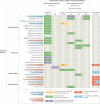Microbiota-mediated colonization resistance against intestinal pathogens
- PMID: 24096337
- PMCID: PMC4194195
- DOI: 10.1038/nri3535
Microbiota-mediated colonization resistance against intestinal pathogens
Abstract
Commensal bacteria inhabit mucosal and epidermal surfaces in mice and humans, and have effects on metabolic and immune pathways in their hosts. Recent studies indicate that the commensal microbiota can be manipulated to prevent and even to cure infections that are caused by pathogenic bacteria, particularly pathogens that are broadly resistant to antibiotics, such as vancomycin-resistant Enterococcus faecium, Gram-negative Enterobacteriaceae and Clostridium difficile. In this Review, we discuss how immune- mediated colonization resistance against antibiotic-resistant intestinal pathogens is influenced by the composition of the commensal microbiota. We also review recent advances characterizing the ability of different commensal bacterial families, genera and species to restore colonization resistance to intestinal pathogens in antibiotic-treated hosts.
Figures


Comment in
-
Biochemical study of monkeypox zoonotic disease associated human skin dysbiosis and soft tissue injury - Correspondence.Int J Surg. 2022 Nov;107:106977. doi: 10.1016/j.ijsu.2022.106977. Epub 2022 Nov 1. Int J Surg. 2022. PMID: 36332786 Free PMC article. No abstract available.
References
-
- Sensakovic JW, Smith LG. Oral antibiotic treatment of infectious diseases. Med. Clin. North. Am. 2001;85:115–123. vii. - PubMed
-
- Diehl GE, et al. Microbiota restricts trafficking of bacteria to mesenteric lymph nodes by CX3CR1hi cells. Nature. 2013;494:116–120. [This study shows that the normal microbiota stimulates MYD88-dependent pathways to restrict the delivery of commensal bacteria to the mesenteric lymph nodes.] - PMC - PubMed
Publication types
MeSH terms
Substances
Grants and funding
LinkOut - more resources
Full Text Sources
Other Literature Sources
Medical

